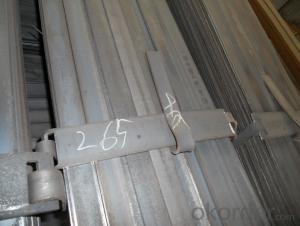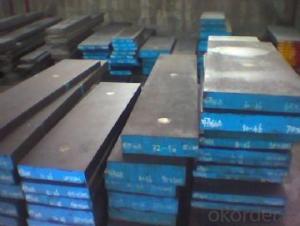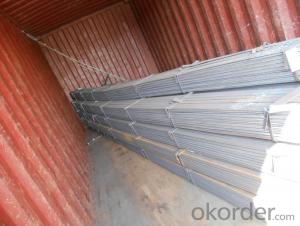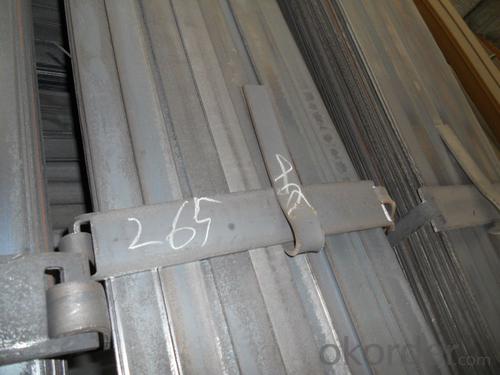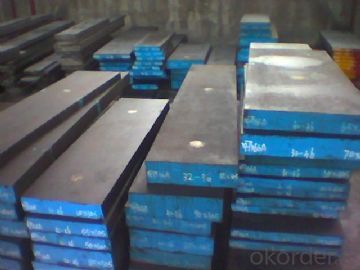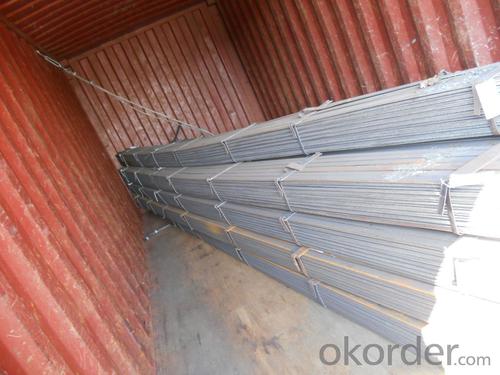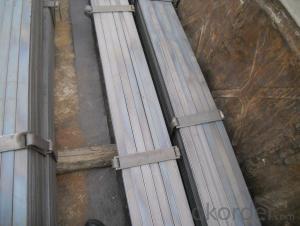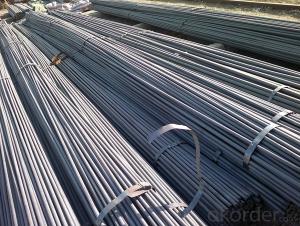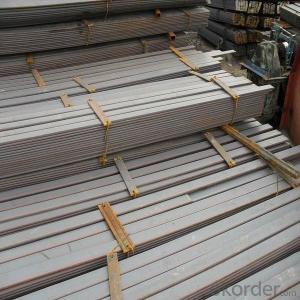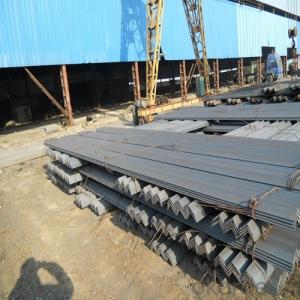Hot rolled Spring Steel Bar/billet/products JIS standard/Europe standard/ ASTM standard
- Loading Port:
- Shanghai
- Payment Terms:
- TT OR LC
- Min Order Qty:
- 50 m.t.
- Supply Capability:
- 1200 m.t./month
OKorder Service Pledge
OKorder Financial Service
You Might Also Like
Specifications
Spring steel flat bar
Garde: 60Si2Mn, 60Si2MnA, 55CrMnA,50CrVA
Standard GB,JIS,ASTM,DIN,AISI,BS
LF & VD forge;ISO&TUV appr
Materials
Q195,Q215,Q235B,Q345B,
S235JR/S235/S355JR/S355
SS440/SM400A/SM400B
Product Category
Metallurgy,Mineral &Energy
Technique
HOT ROLLED
Packing
1.Big OD:in bulk
2.Small OD:packed by steel strips
3.woven cloth with 7 slats
4.according to the requirements of customers
Usage
Mechanical&manufacture,Steel strcuture,
Shipbuilding,Bridging,Automobile chassis
Main market
Middle East,Africa, Asia and some Uropean country and America ,
Australia
Country of origin
China
Productivity
15000 Metric Tons pet Month
Remark
Payment terms :T/T ,L/C
Terms of trade :FOB ,CFR,CIF ,DDP,EXW
Minimum order : 10 tons
Lead time :on or before 3-15 working days .
- Q: What are the key alloying elements used in special steel?
- The specific application and desired properties determine the key alloying elements used in special steel. Some commonly used alloying elements in special steel are chromium, nickel, molybdenum, vanadium, tungsten, and cobalt. To enhance the steel's hardness, wear resistance, and corrosion resistance, chromium is often added. Nickel, on the other hand, increases the steel's strength, toughness, and corrosion resistance. Molybdenum is commonly used to improve the steel's high-temperature strength, resistance to creep, and resistance to corrosion by certain chemicals. Vanadium is added to increase the steel's strength, toughness, and wear resistance, especially at high temperatures. Tungsten is another element used to enhance the steel's high-temperature strength and wear resistance. Cobalt, on the other hand, is often added to improve the steel's strength and toughness, particularly at elevated temperatures. These alloying elements are carefully chosen and added in specific proportions to achieve the desired properties for various applications, including aerospace, automotive, energy, and tooling industries. By incorporating these alloying elements, special steel can be customized to meet specific performance requirements, making it suitable for a wide range of demanding applications.
- Q: How is stainless tool steel used in the manufacturing of surgical instruments?
- Stainless tool steel is commonly used in the manufacturing of surgical instruments due to its desirable properties such as high corrosion resistance, durability, and ease of sterilization. It provides the necessary strength and precision required for surgical tools, ensuring their longevity and performance in various medical procedures. Additionally, stainless tool steel can withstand repeated exposure to sterilization methods like autoclaving, making it a reliable choice for surgical instrument manufacturing.
- Q: Can special steel be used for medical applications?
- Yes, special steel can be used for medical applications. It is often used for surgical instruments, implants, and medical devices due to its high strength, corrosion resistance, and biocompatibility.
- Q: How does special steel perform in terms of impact resistance?
- Special steel typically performs very well in terms of impact resistance. Due to its unique composition and manufacturing process, it is able to withstand high amounts of force and pressure without fracturing or breaking. This makes it highly suitable for applications where impact or shock loads are common, such as in construction, automotive, and aerospace industries.
- Q: What are the requirements for special steel used in automotive parts manufacturing?
- The requirements for special steel used in automotive parts manufacturing include high strength, durability, and resistance to impact and wear. It should also have excellent formability and weldability for easy shaping and joining processes. Additionally, the steel must meet specific standards for chemical composition, heat treatment, and surface finish to ensure optimal performance and safety in automotive applications.
- Q: How is special steel used in the production of automotive springs?
- Automotive springs, including suspension springs and valve springs, require special steel due to its unique properties that make it perfect for this purpose. Special steel, also called alloy steel, is specifically designed to have superior mechanical properties compared to regular steel. By adding alloying elements like chromium, nickel, or molybdenum, its strength, hardness, and resistance to wear and fatigue are improved. When it comes to producing automotive springs, special steel is used to create springs capable of withstanding the demanding conditions of the vehicle's suspension system. These springs must not only absorb and distribute the vehicle's weight but also provide a smooth and comfortable ride. The exceptional strength of special steel allows automotive springs to handle heavy loads without deforming or breaking. This is crucial for maintaining vehicle stability and safety, especially on rough roads or when carrying heavy loads. Furthermore, special steel's fatigue resistance is vital in the production of automotive springs. Over the vehicle's lifespan, these springs undergo millions of compression and expansion cycles. The fatigue resistance of special steel ensures that the springs can maintain their performance and reliability over an extended period. Moreover, special steel's resistance to wear and corrosion is highly advantageous in automotive applications. Springs are exposed to various environmental elements like moisture, dirt, and chemicals, which can cause corrosion and deterioration. The corrosion resistance of special steel helps prolong the lifespan of automotive springs and maintains their functionality. In conclusion, the use of special steel in manufacturing automotive springs guarantees that these crucial components can endure heavy loads, repetitive stress, and high temperatures. Its superior mechanical properties, including strength, fatigue resistance, and corrosion resistance, make it the ideal material for automotive springs, enhancing the overall performance and durability of vehicles.
- Q: What are the specific requirements for special steel used in the railway sector?
- The specific requirements for special steel used in the railway sector are crucial for ensuring the safety, durability, and efficient operation of the railway infrastructure. Some of the key requirements include: 1. High strength: Special steel used in the railway sector must possess exceptional strength to withstand heavy loads, vibrations, and impacts. This is crucial for maintaining the structural integrity of tracks, bridges, and other components. 2. Wear resistance: Railway tracks and wheels experience significant wear due to continuous contact and friction. Special steel must have excellent wear resistance to minimize the need for frequent maintenance and replacement. 3. Fatigue resistance: The constant cyclic loading experienced by railway components demands high fatigue resistance in the steel. This allows them to withstand repetitive stress and prevents the occurrence of fatigue failures. 4. Corrosion resistance: Railway infrastructure is exposed to various environmental conditions, such as moisture, extreme temperatures, and chemicals. Special steel must possess good corrosion resistance to prevent rusting and degradation, ensuring a longer service life. 5. Heat resistance: In certain applications, such as rail joints and fasteners, special steel is subjected to high temperatures due to friction and stresses. The steel must have good heat resistance to maintain its mechanical properties under such conditions. 6. Weldability: Special steel used in the railway sector should have good weldability to enable efficient and reliable joining of components during manufacturing and maintenance processes. 7. Ductility and toughness: The steel must exhibit sufficient ductility and toughness to absorb energy and resist fracture in the event of a collision or impact, ensuring passenger safety. 8. Dimensional stability: Special steel used in the railway sector must maintain its dimensional stability under varying temperatures and loads to prevent deformation and ensure proper alignment of tracks and components. Meeting these specific requirements for special steel in the railway sector is essential for ensuring the safety, reliability, and longevity of railway infrastructure, contributing to the smooth operation of the entire transport network.
- Q: How does special steel contribute to the automotive aftermarket?
- The automotive aftermarket greatly benefits from the inclusion of special steel, as it aids in the advancement and enhancement of various automotive components. This top-notch steel is engineered specifically to possess remarkable strength, endurance, and resistance against wear and tear. One of the primary manners in which special steel contributes to the automotive aftermarket is through the production of performance parts. These parts are crafted to enhance the efficiency and performance of vehicles, catering to the desires and preferences of car enthusiasts. For instance, special steel is utilized in the production of exhaust systems, turbochargers, and intake manifolds, enabling an increase in horsepower and torque, as well as improved fuel efficiency. Furthermore, the production of suspension components, such as coil springs and sway bars, benefits from the usage of special steel. These components provide superior handling and stability, elevating the driving experience and ensuring the safety of both the vehicle and its occupants. Moreover, special steel is essential in the manufacturing of braking systems, encompassing rotors and brake calipers. These components are essential in achieving effective braking and maintaining control of the vehicle. By incorporating special steel, aftermarket brake systems can offer enhanced stopping power, reduced fade, and increased resistance to high temperatures. Additionally, special steel finds application in the production of engine components, including crankshafts, connecting rods, and valve springs. These components endure extreme forces and temperatures, and the exceptional strength and heat resistance of special steel enable them to withstand such conditions, resulting in improved engine performance and longevity. In conclusion, special steel significantly contributes to the automotive aftermarket by aiding in the development of high-performance parts, suspension components, braking systems, and engine components. Its outstanding strength, endurance, and resistance to wear and tear guarantee improved vehicle performance, efficiency, and overall driving experience.
- Q: How does special steel contribute to the manufacturing of defense equipment?
- The unique properties and characteristics of special steel play a vital role in the production of defense equipment. To begin with, special steel is renowned for its exceptional strength and durability, making it perfect for constructing various defense equipment components. This high strength enables the creation of lightweight yet sturdy structures, allowing for the development of advanced weaponry and protective gear. Additionally, special steel possesses remarkable resistance to corrosion and wear, making it highly suitable for defense equipment operating in harsh environments. Its resistance to corrosion ensures that the equipment remains functional and dependable even in extreme conditions, including exposure to saltwater or acidic environments. Moreover, special steel offers outstanding heat resistance, a crucial feature for defense equipment like missile casings or jet engine components. Its ability to withstand high temperatures without compromising its integrity or mechanical properties enables the production of more efficient and powerful defense systems. Furthermore, special steel can be customized to meet specific requirements, facilitating the manufacturing of personalized defense equipment. It can be alloyed with various elements to enhance specific characteristics, such as increased hardness, improved magnetic properties, or better impact resistance. This adaptability allows for the production of defense equipment tailored to the precise needs of military applications, enhancing overall performance. In conclusion, special steel significantly contributes to the manufacturing of defense equipment through its exceptional strength, resistance to corrosion and wear, heat resistance, and customization options. These properties enable the creation of more advanced, reliable, and efficient defense systems that meet the demanding requirements of modern military operations.
- Q: How does special steel perform in high-temperature hydrogen environments?
- Special steel typically performs well in high-temperature hydrogen environments due to its excellent resistance to hydrogen embrittlement and oxidation. It maintains its mechanical strength and integrity, preventing potential failures or degradation in such conditions. Additionally, special steel alloys can exhibit enhanced corrosion resistance, making them suitable for various industrial applications involving high-temperature hydrogen exposure.
Send your message to us
Hot rolled Spring Steel Bar/billet/products JIS standard/Europe standard/ ASTM standard
- Loading Port:
- Shanghai
- Payment Terms:
- TT OR LC
- Min Order Qty:
- 50 m.t.
- Supply Capability:
- 1200 m.t./month
OKorder Service Pledge
OKorder Financial Service
Similar products
Hot products
Hot Searches
Related keywords
